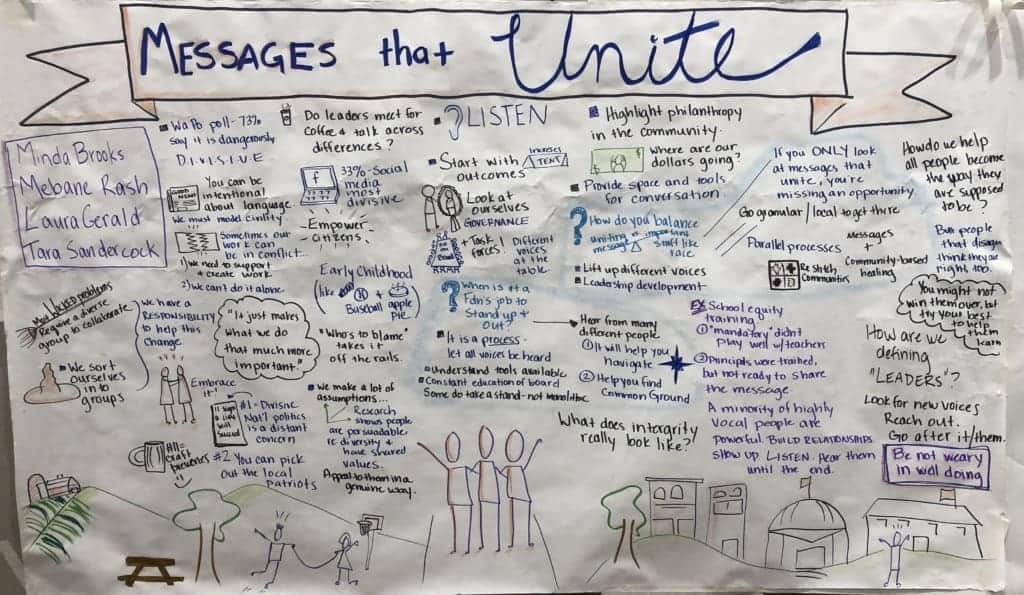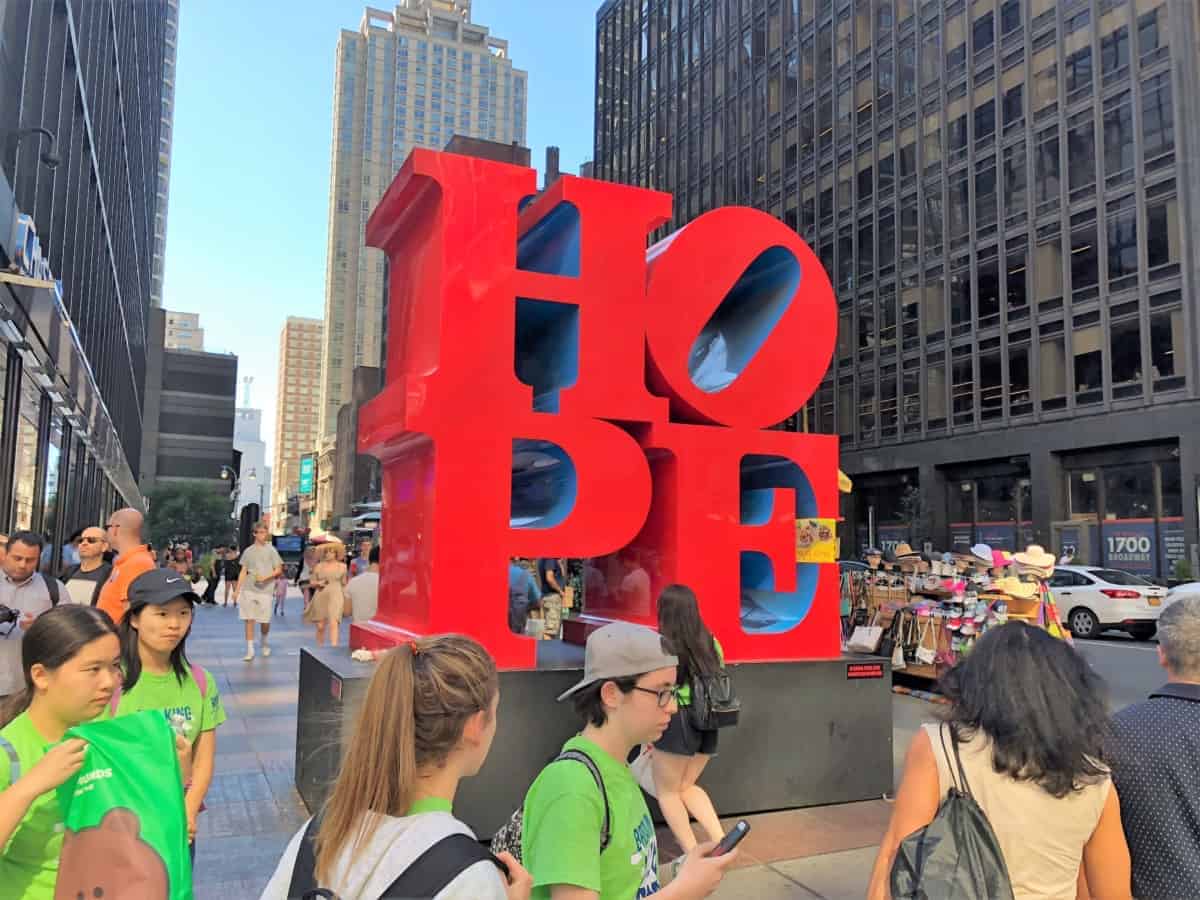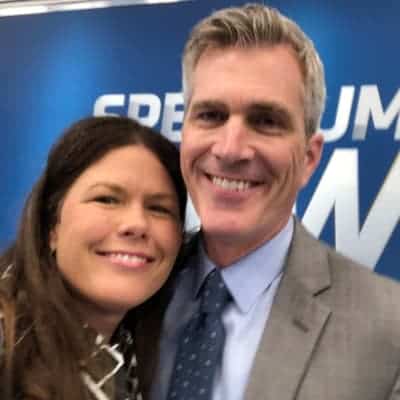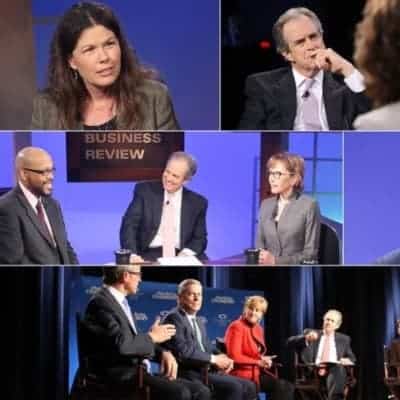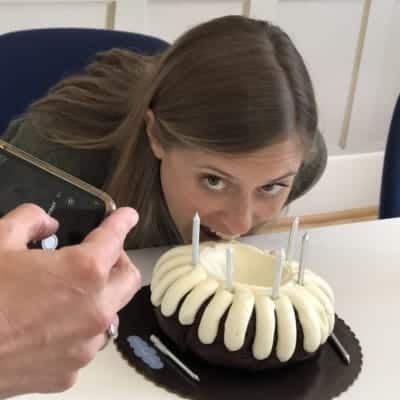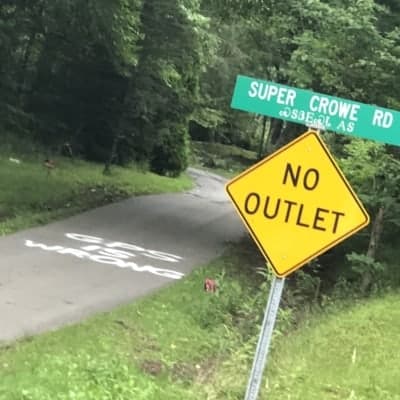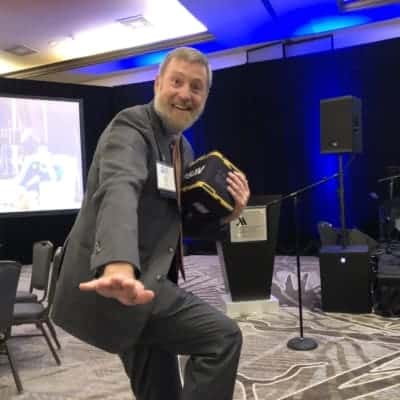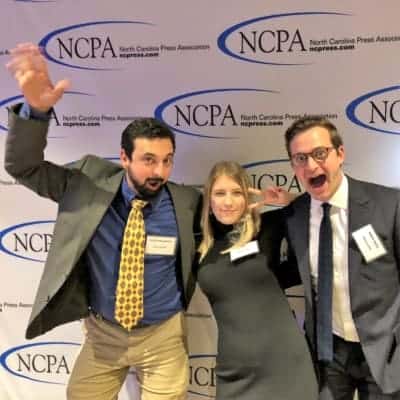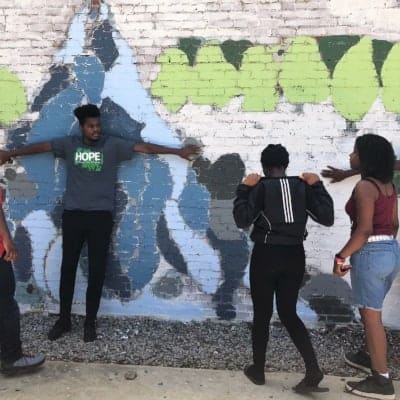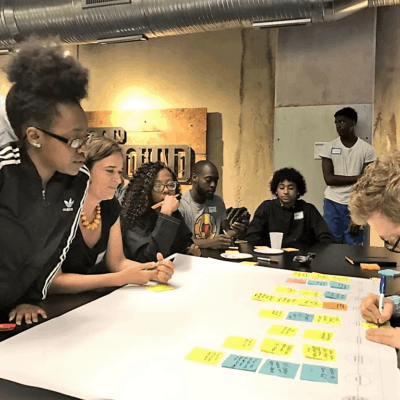These days when I give a speech, it starts like this…
“My name is Mebane, and I am in the business of hope.”
Why hope? Because our students deserve it, our teachers still have it, and the people and the places of our state yearn for it. We believe the future doesn’t just happen to us. We have agency in shaping it. And that’s where you come in.
Today marks the anniversary of the launch of EducationNC and the beginning of year five for us. Our work continues to be my greatest privilege, and I am filled with awe and gratitude for you, our audience. Thank you.
Building EdNC and our architecture for your participation
North Carolina has been the love of my life. I love all of it, all 100 counties, from the 23 that voted 70+ percent for President Trump to our urban blue crescent to all of the purple counties in between. Most days I am out on the road, getting to know the people, the local leaders, the philanthropists, the newsmakers, and the policymakers who make up our nooks and crannies.
I am a lawyer, not a journalist. But in 2014, our founders and the low-wealth school superintendents asked me if I would build EdNC. With the decline of rural media, the superintendents did not know who to trust, they did not feel like they had a voice in the conversation, and no one was going to tell the stories — the stories of the students, the teachers, the school leaders in their districts, the challenges and opportunities they face, the best practices they uncover. And in that vacuum, there was space for the birth of a negative narrative about our public schools.
We started with three of us and $265,000, and in four years, we have become a team of 10+, a collection of nonprofits and initiatives, with a $2 million budget, establishing North Carolina as the most information rich state in the nation on the issue of education. And that’s a big deal.
When we launched on January 12, 2015, we were focused on availability and confirmation bias, and building your architecture of participation to tackle both head on.
Two business principles are at play in North Carolina policy and politics. People base their perceptions on the information that is easiest to come by — that’s availability. But the availability of information is complicated by another business principle called confirmation bias. People seek and consume information that confirms what they want to believe. EdNC is committed to changing the nature of the conversation this state is having about public schools. We are decidedly all-partisan in our approach.
In our second year, we focused on transparency, trends, and engagement, and the importance of your voice in the evolution of party politics in North Carolina.
https://www.ednc.org/2016/01/12/ednc-and-party-politics/
By year three, we were thinking about impact and our theory of change, and the word “hope” began to be a part of our organizational culture. We continue to believe in our seven drivers of impact, which we believe lead to change: journalism as the fourth estate in a democracy, in-depth research, reach and analytics, feedback from the people who use our work, moving the needle on policy change, responsive experimentation in the new media and nonprofit world, and increasing leadership capacity statewide.
https://www.ednc.org/2017/01/15/impact-hope-edncs-theory-change/
In year four, we continued to make sure we had all the tools we needed in our toolbox to serve all of our audience, building our own capacity to text, email, and survey you. The students and the schools we serve are in communities in all 100 of our counties. All means all to us.
https://www.ednc.org/2018/01/15/ednc-turns-3-art-lifting-public-public-policy/
This year with our expansion into postsecondary education, EdNC has become your go-to, trusted source in North Carolina for independent news, research, data, information, and analysis about the major trends, issues, and challenges bearing on education across the birth to career continuum.
“I want to thank you for the outstanding coverage over the past year. It was not only extraordinary content, but the range of topics was remarkable. Your work has indeed made a difference in public awareness and public discourse on the issues of our time in education.” — Ann Goodnight
https://www.ednc.org/2018/08/20/educationncs-annual-report-2017-18/
The N.C. Center for Public Policy Research is our policy hub, a 40-year-old, nonpartisan think tank studying the most important policy issues facing our state.
Reach NC Voices is our industry-leading initiative that builds our tech tools to connect us to people and people to us. These tools allow us to discuss issues with people in real time so we can better understand communities across our state by listening and listening deeply.
First Vote NC allows high school students to participate in online, simulated elections so they graduate civic ready. It expands the opportunity for civic education statewide, building a more informed electorate. This year, First Vote won the national Civvy’s award for the best initiative in the nation educating students on voting and civic responsibility.
The scope of our work is not limited to education. From the beginning we have said we cannot cover education without covering poverty, health care, the economy, the urbanization of our state, and our future.
You are the most important part of our work. Our work only matters if people consume, share, and use our information to build a better world.
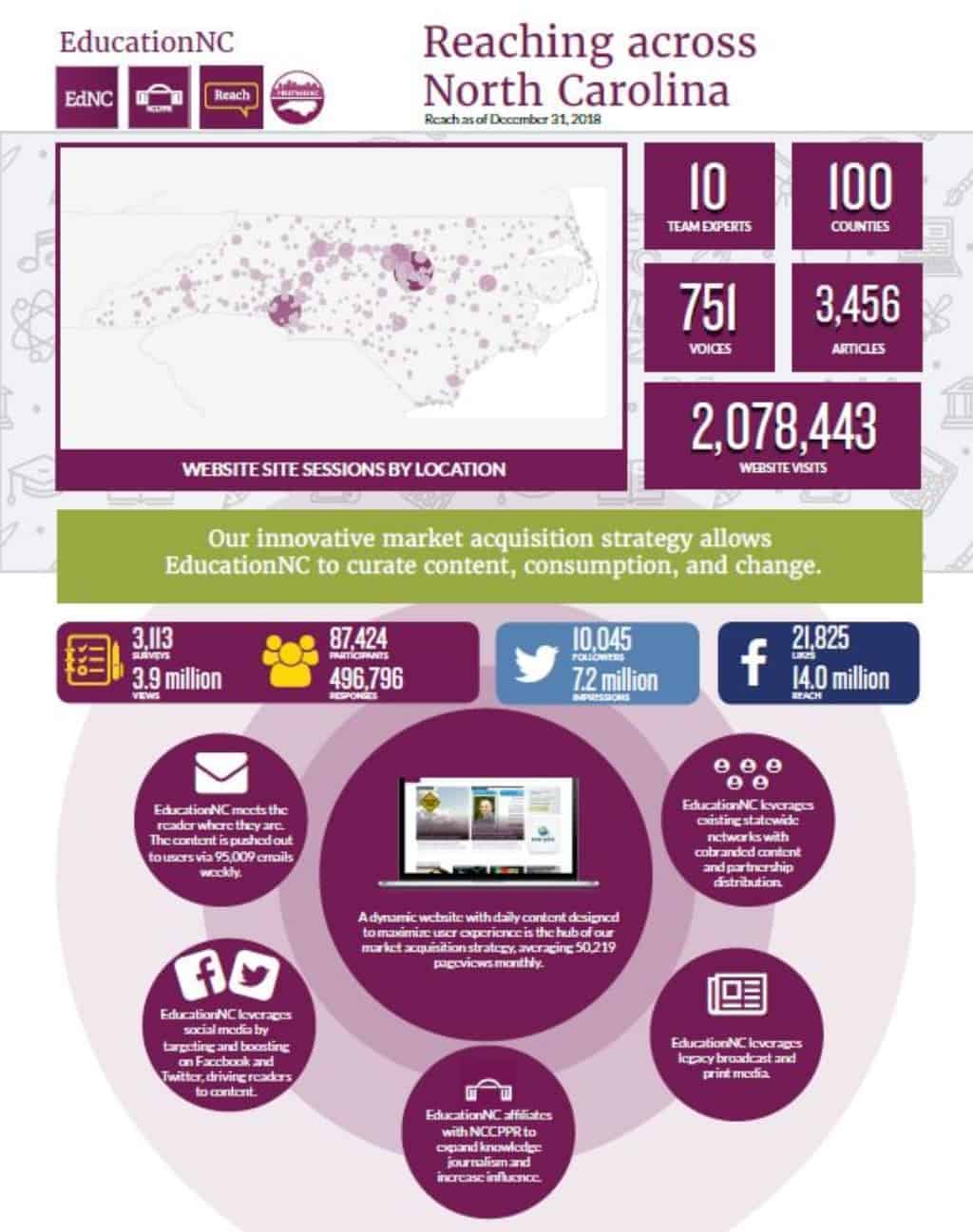
We have more than 50,000 pageviews a month. We publish seven newsletters and send out almost 100,000 emails each week. We reach a lot more people on social media, including more than 10,000 followers on Twitter and more than 20,000 followers on Facebook. We partner with legacy media, including Spectrum News, Carolina Business Review, and WRAL. We are people first, audience first.
If you aren’t already, in 2019, please become part of our architecture of participation. Sign up for our daily digest or one of our other newsletters. Email an article to a friend. Post it on your Facebook page. Tweet your reaction. Take a survey. Comment on an article. Write an article. Engage.
EdNC highlights for 2019
Ferrel Guillory, our co-founder and editorial advisor, tells us that our work is what legacy news organizations call, “The Daily Miracle.” Meet the lovely people who make our daily miracle happen, meet Team EdNC:
We are a bottom up organization, believing that on our best days the leadership team supports our team of peer experts in doing their best work. It is remarkable — and humbling — to watch our team will our vision into reality with fidelity day in and day out. To our team, you are loved, and we are thankful.
This year, Nation Hahn, our chief growth director and our boy wonder, will participate in the Media Transformation Challenge at Harvard’s Kennedy School of Government. Tim Griggs, the former publisher of the Texas Tribune and our Yoda for the Knight-Lenfest Newsroom Initiative, will be his coach. Proud, we are. Excited, we are.
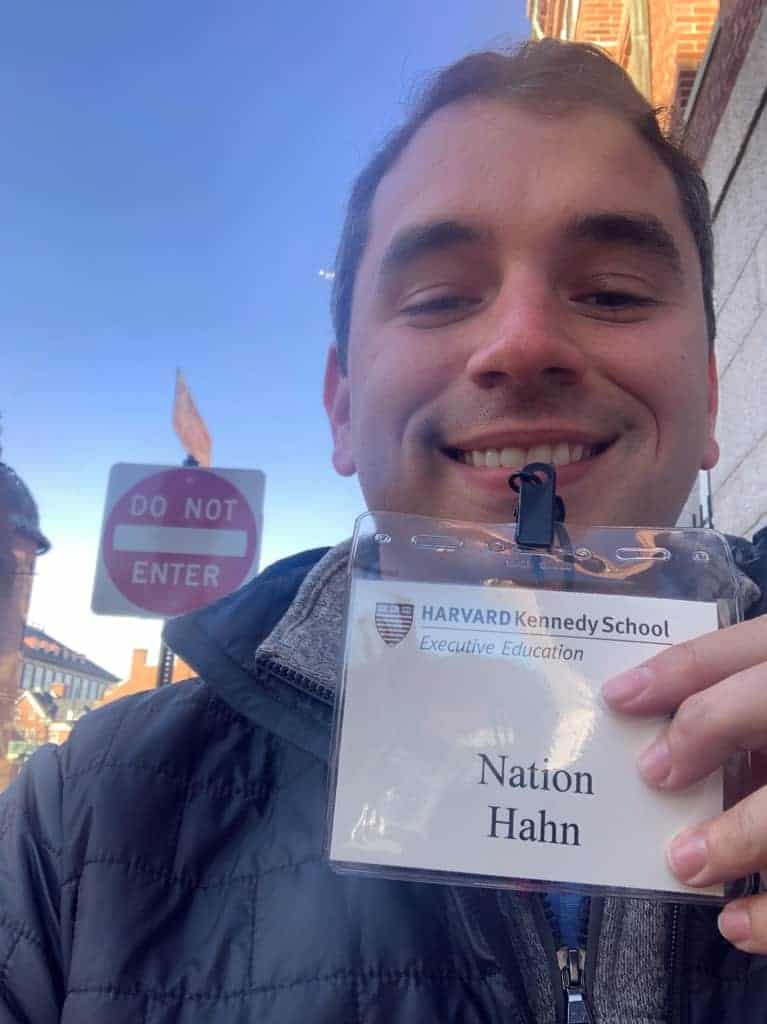
Our data scientist, Bryan Noreen, is building an industry-leading engagement dashboard for us, including a loyalty tracker for our audience. More on this tech tool in Nation’s article tomorrow.
As we continue our @EducationNC data dashboard build out we consider how to visualize users moving through the funnel towards loyalty. @HeyTimGriggs @NationHahn @Mebane_Rash pic.twitter.com/baInYZhogc
— EdNC Data (@EdNCdata) December 19, 2018
We are thankful every day for the remarkable vision of Alisa Herr, our former chief technology officer, for the beautiful design and functionality of our platform and how well it has served our ever changing and growing audience and work. This spring we will roll out a new website we hope you will love even more. Here is a sneak peak:
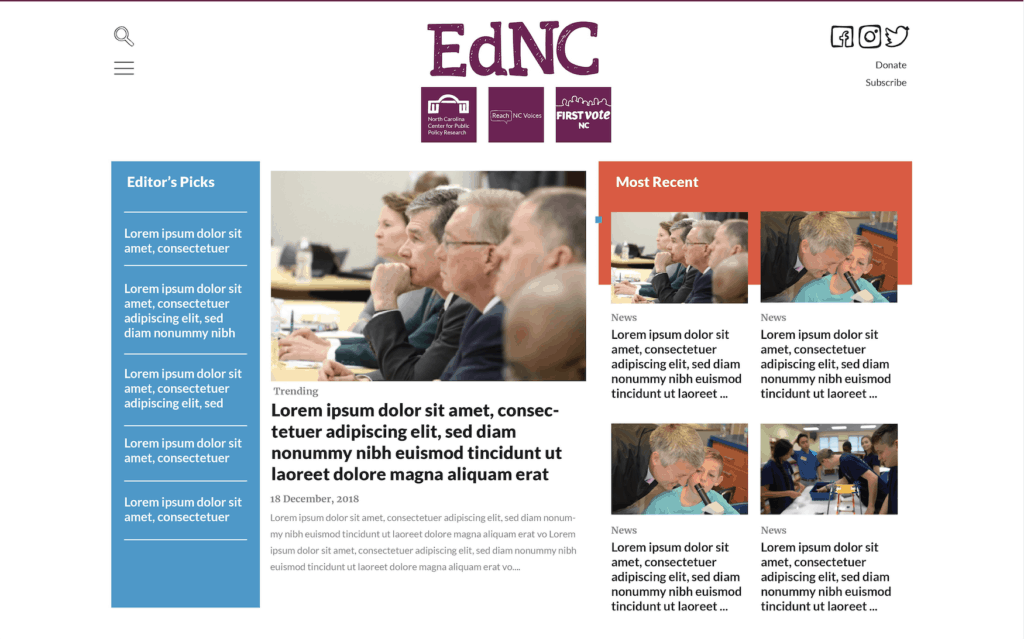
The N.C. Center for Public Policy Research is conducting a three-year study of equity across North Carolina. This spring, we will publish a report on the history of race and education in North Carolina and statewide data on equity for our students and schools. For the next three years, our EdAmbassadors will be holding convenings on equity in our schools and communities across the state, and in 2019-20, we will launch four equity fellowships.
On April 28-30, EdNC will invite stakeholders, philanthropists, and policymakers to have coffee or perhaps a martini, build relationships, and explore common ground for systems change. It’s called BRIDGE.
Yasmin Bendaas continues to cover STEM, Liz Bell covers B-8, Rupen Fofaria covers learning differences, and Caroline Parker covers faith.
ICYMI, I’m particularly proud of Yasmin’s series on juuling, Liz’s series on early colleges, our series on residency determination, and Kristen Blair’s series on screens in schools.
Expect great things from us. I do.
The lay of the land in North Carolina in 2019
Since the shooting at Butler High School, the hardest day of my professional life, I have been asking this question, what’s our greater North Carolina?
What’s our greater on the issues of today, and what’s our greater on the issues of tomorrow?
https://www.ednc.org/2018/12/05/living-loving-learning-and-leading-for-our-students-our-state-and-our-future/
Here are a few things I want on your minds for 2019.
Forces for systems change
The work of a commission called myFutureNC. North Carolina is one of just five states without an attainment goal, but we will have one in 2019. myFutureNC held nine listening sessions across North Carolina in 2018, along with focus groups and additional meetings of the full commission. The report of the commission will be released on February 20, and EdNC will be there.
As part of the myFutureNC process, Anita Brown-Graham with ncIMPACT identified bright spots to educate and train workers all across North Carolina. ncIMPACT premieres Thursday, January 17, at 10 PM, on UNC-TV.
https://www.ednc.org/2018/11/21/ever-thankful-for-north-carolinas-bright-spots-and-our-leaders-who-are-working-to-build-a-greater-north-carolina/
There are the things I want you to know about Leandro, the lawsuit that defines our constitutional right to a sound basic education. The lawsuit has a new judge, Judge David Lee. An external consultant, WestEd, is working on a report for the court to identify what it would take in terms of school leadership, teachers, and funding for each child to have a sound, basic education. And the Governor has appointed a commission to take up the findings and recommendations of the court. Stay tuned this spring.
Leslie Boney at the Institute for Emerging Issues is leading the way to ReCONNECT our state. Six forums, four locations, over three years. The next ReCONNECT is on February 11 in Raleigh, and I hope you will join IEI on their journey to leverage interconnections across people, place, and prosperity to build a greater North Carolina. This forum is about our rural-urban connections. Sign up today.
All of this work needs to be aligned for our students, our state, and our future as we head towards 2020. The 2020 elections matter. It’s a 10-year election, and I want you to remember the four Ms. The party that wins the Majority will draw the Maps, raise the Money, and build Momentum.
EdNC continues to act as a “force multiplier” as we amplify the good work of others. The issues we face are too big for one leader, one organization. This — our students, our state, our future — is on all of us.
The issues
EdNC’s legislative previews will be coming out later this week so tune in for a deep dive on the issues we expect to be taken up by the N.C. General Assembly in the long session.
The legislature will reconvene on January 30, and our Reach NC Voices will launch the People’s Session — a project that aims to understand your agenda and priorities for education in North Carolina from the issues that keep you up at night to the issues that have you everything from angry to hopeful. Please weigh in.
The biggest issue is whether consensus or gridlock will prevail on Jones Street with the Republican’s veto proof majority broken. Take a listen to Jonathan Kappler’s review of the political lay of the land:
https://www.youtube.com/watch?v=7bVBerXcwi0&feature=youtu.be&list=PLUHd18eD7tFVpbwhPRWOeqvSp97ijeQ5_
I continue to believe governance and accountability is one of the most important education issues facing our state. And this weekend, in an op-ed for The News & Observer, Margaret Spellings wrote, “How we organize and govern ourselves when dealing with issues as important and controversial as education matters.”
In North Carolina, we have the Governor, the Governor’s Education Cabinet, the legislature, UNC’s President and Board of Governors, 17 campuses each with a chancellor and board of trustees, the President and State Board of Community Colleges and 58 community colleges across NC with their own president and board of trustees, the Superintendent of Public Instruction, the Department of Public Instruction, the chair of the state board of education, the state board of education, 115 school boards for 115 districts, 115 superintendents, 185 charter schools, two virtual schools, and 100 county commissions that fund local education. There are also a bunch of other committees and commissions working on various issues, which EdNC’s Liz Bell is working to update for you.
Answer me this, North Carolina:
Who is in charge?
When it is not clear who is in charge, it is also not clear who is accountable.
In this podcast, EdNC’s Alex Granados talks with Peter Hans, president of the N.C. Community College System, about our community colleges and their priorities this legislative session.
Certainly school safety, a $1.9 billion bond referendum, the funding formula for our schools including pre-K, and teacher and principal pay will all be on the table, but there are a handful of issues from calendar flexibility to the low-performing designation for schools to how school grades are calculated that could have bipartisan support and not cost a whole lot of money. Dr. Stephen Gainey, the superintendent of Randolph County Schools, weighs in:
EdNC will continue to follow new approaches to transforming public education assessing whether they work or not from the district-led reform by Superintendent Lynn Moody in the Rowan-Salisbury Schools, to UNC’s lab schools, to a student-led microschool in Edgecombe County, to our restart schools, to the Innovation School District.
The lay of the land nationally
Last week, Education Week released a special report on the 10 big ideas in education: school is boring — remember our Miracle; teachers have hope, but not trust; special education is broken; elite bilingualism is a problem; visioning the end of annual testing; learning from black students in military families; segregation; consent; innovation; and college admissions.
Here is Education Week’s six issues to watch in 2019, with Democrats taking over the U.S. House of Representatives and Rep. Bobby Scott, D-Va., the incoming chair of the House education committee: congressional oversight of Secretary Betsy DeVos and the education department; possible federal legislation from the Higher Education Act to FERPA; immigration; the Every Student Succeeds Act (ESSA); the leadership of Secretary DeVos; and the 2020 presidential campaign (here is Education Week’s early cheat sheet on the possible candidates and where they stand on schools).
Compare that with the 74 Million’s “6 Education Predictions for the New Split Congress,” including higher ed, school infrastructure, disciplining students with disabilities, the reauthorization of existing education laws, ESSA, and federal support of charter schools and private school choice.
Brookings released six trends in higher education last week too, noting “[w]hile there are many factors influencing the direction of post-secondary education around the world, three are particularly noteworthy for influencing recent innovation: reduced return on investment for students, reduced government spending, and significant skills mis-matches between graduates’ abilities and jobs available.” Their trends include online education and stackable credentials, competency-based education, income share agreements, online program manager organizations, enterprise training companies, and transnational education.
The Education Writers Association released this analysis of what’s ahead for private school choice in 2019, noting that the action will take place at the state level, with voucher and voucher-like programs growing in some states and facing push back in others.
In this EWA podcast, Dana Goldstein, a national education reporter for The New York Times, shares the issues she’ll be following in 2019 with suggestions for reporters on how to cover and localize them.
The lay of the land in our industry
My first job was a column I wrote for The Charlotte Observer in 6th grade. Rolfe Neill, the Observer’s former chairman and publisher, has been my mentor ever since.
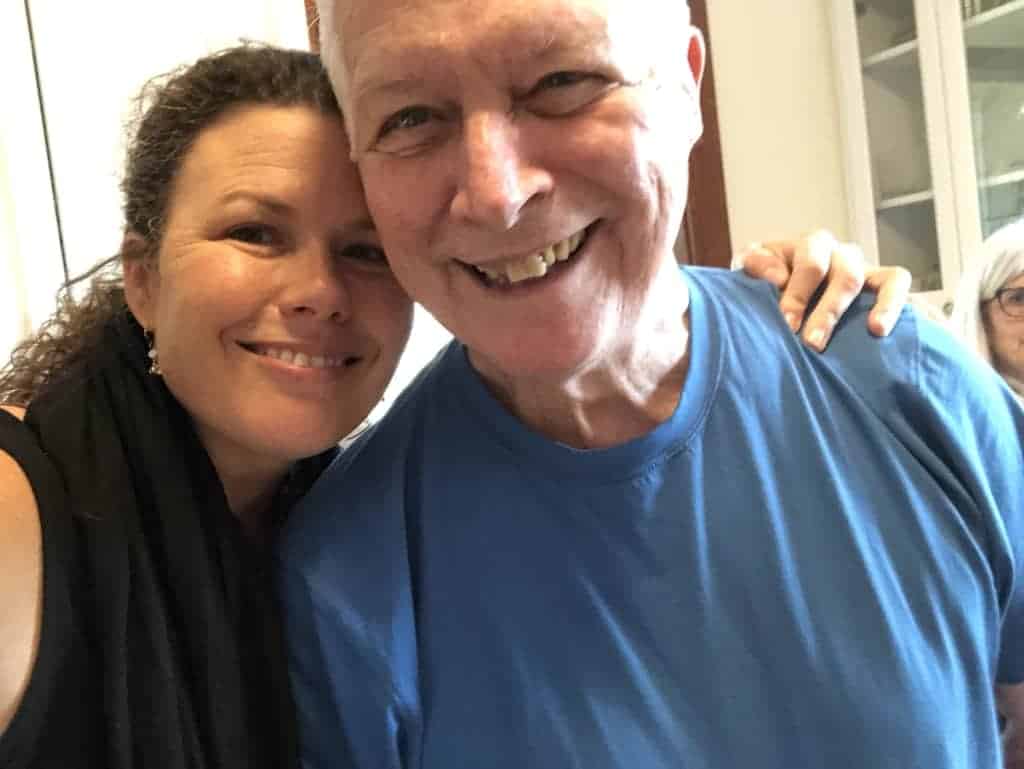
On January 18, 2015, just a couple days after EdNC launched, Rolfe sent me several things to keep in mind, which he enumerated:
- Numbers are one measure; what’s the best measure of our new work?
- What did I fail at this week?
- Where are we making a difference; how do we know?
- Remembering that serious work should never be done by humorless people: Are we having fun?
- Accuracy above all.
- No article should be started without reflecting on Paschal telling his friend: “I would have written you a shorter letter if I had more time.”
I kept his list with me at all times during the first year, and it still informs our work.
In 2019, this list of seven resolutions for newsroom leaders from the Columbia Journalism Review has my attention. Here it is with some reflections.
- “Own a topic.” When we pressed publish on our first big story four years ago, EdNC’s Alex Granados took on the North Carolina’s principal pay system and the impact on school leadership. He continues to own this issue.
- “Start planning for 2020.” From speeches on the evolution of party politics to our priorities project, we are working to make sure the elections are informed by what people across North Carolina want when it comes to our students, our state, and our future. Our coverage will be less focused on the candidates and more focused on the issues.
- “Use precise words.” Do you call the use of e-cigarettes vaping or juuling? Do you think of early colleges as Cooperative Innovative High Schools? Do you know our legislature is called the N.C. General Assembly? Do you know what we mean when we say “clinical practice?” Words matter in our work.
- “Check your culture.” From love to wellness to equity, our workplace culture is always on our minds and always evolving.
- “Improve communication to improve collaboration.” We continue to monitor and adjust our internal and external communication strategies. If you don’t know what Slack is, check it out.
- “Keep working on feedback.” Thanks to Tim Griggs and the Knight-Lenfest Newsroom Initiative, we are building reflective practice into all that we do. You can find us on most Mondays at the downtown Y in Raleigh going over our analytics from the previous week and making adjustments to future content based on what we learn about what you think of our work.
- “Be proud and kind.” I am proud of the tens of thousands of miles we drive to show up in communities across our state. I am proud of the issues we uncover and lift up to our entire state. I am proud of the transparency and sunlight that flows from attending meeting after meeting, often as the only news organization that is present. I am proud of the partnerships we build. I am proud of the stories we tell. I hope you find us kind when we show up in your schools and communities. Let me know if you don’t.
Hope is important even in our industry. “Inspire me” makes this BBC list of ways to reach younger audiences:
Audiences expect news publishers to satisfy their needs in six ways:
1. Update me
2. Give me perspective
3. Educate me
4. Keep me on trend
5. Amuse me
6. Inspire me@dmitryshishkin says we need to address these different needs in order to reach younger audiences #GNILondon pic.twitter.com/CYmL1NLXWu— Caroline Scott (@CScottVideo) December 7, 2018
Hope drives action…and change
In Spellings op-ed, she also wrote, “the trend lines are clear: the best is yet to come. And just how exceptional that future will be is a choice we all get to make.”
Recently, Dr. Karen Stout, president of Achieving the Dream, spoke at the Dallas Herring lecture at N.C. State, challenging us to “step up and focus forward.”
Stepping up and focusing forward can be hard if it requires change. Listen to this superintendent talk about the need for our state to build communities that work together so that our students — who are our next generation of future leaders — have hope:
You, the people of North Carolina, you are our greater. I hope you will help us lead the way.
#loveNC,

My favorite outtakes
